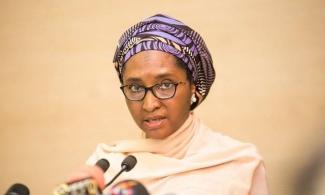
This was disclosed on Monday by the Minister of Finance, Budget and National Planning, Zainab Ahmed, when she gave a breakdown of the country’s budget deficit and its implications in the 2023 fiscal year.
The President Muhammadu Buhari-led Nigerian government has declared that due to high budget deficit, there will be no money for Ministries, Departments and Agencies (MDAs) to undertake capital projects in 2023.
This was disclosed on Monday by the Minister of Finance, Budget and National Planning, Zainab Ahmed, when she gave a breakdown of the country’s budget deficit and its implications in the 2023 fiscal year.
The minister said that the government would not make provision for treasury-funded MDAs capital projects in 2023.
Ahmed spoke during the presentation of the 2023-2025 Medium Term Expenditure Framework and Fiscal Strategy Paper before the House of Representatives Committee on Finance.
She revealed that the budget deficit for the 2023 fiscal year may run between N11.30trillion to N12.41trillion depending on the choice that would be made by the government on the issue of fuel subsidy.
The Finance Minister put the aggregate expenditure of the government for 2023 at N19.76trillion.
Ahmed's projection was based on crude oil production challenges and fuel subsidy deductions by the Nigeria National Petroleum Company Limited (NNPC), noting that those constitute significant threats to the achievement of the nation’s revenue growth targets.
She said, “In this scenario, the budget deficit is projected to be N11.30 trillion in 2023, up from N7.35 trillion in 2022. This represents 5.01 per cent of the estimated GDP, above the 3 per cent threshold stipulated in the Fiscal Responsibility Act, 2007.
“Given the severely constrained fiscal space, the budget deficit is projected to be N12.41 trillion in 2023, up from N7.35 trillion budgeted in 2022, representing 196 per cent of total FGN revenue or 5.50 per cent of the estimated GDP.
“This is significantly above the 3 per cent threshold stipulated in the Fiscal Responsibility Act 2007 and there will be no provision for treasury funded MDA’s capital projects in 2023.”
Giving further overview of the government revenue using two scenarios, the minister said that “Under the first scenario, federal government revenue for 2023 at N6.34 trillion, out of which only N373.17 billion is expected from oil-related revenue, while the balance of N5.97 will come from non-oil sources.
"In addition to subsidy reform, this scenario assumes an aggregate implementation of cost to income limit of Government Owned Companies. With these, the 2023 FGN revenue is projected at N8.46 trillion out of which N.99 trillion or 23 per cent is projected to come from oil revenue sources.”
She noted that on the key assumption on which the 2023 budget would be based, the oil benchmark for 2023 was estimated at 70 dollars per barrel, with an oil production benchmark of 1.69 million litres per day and an exchange rate of N435.02 to the dollar, while inflation is expected to grow at 17.16 percent.
Ahmed then stressed that the country's Gross Domestic Product (GDP) is expected to grow at 3.75 percent, while upward pressure on prices is expected to be driven by the current and lag effect of the global price surge due to the Russia-Ukraine war, domestic insecurity, rising costs of imports, exchange rate depreciation as well as other supply-side constraints.
She also revealed that growth in nominal consumption has been adjusted in line with revised estimates based on changes in the components of GDP and historical performances, stressing that medium-term nominal consumption is projected at N121.93trillion in 2023.